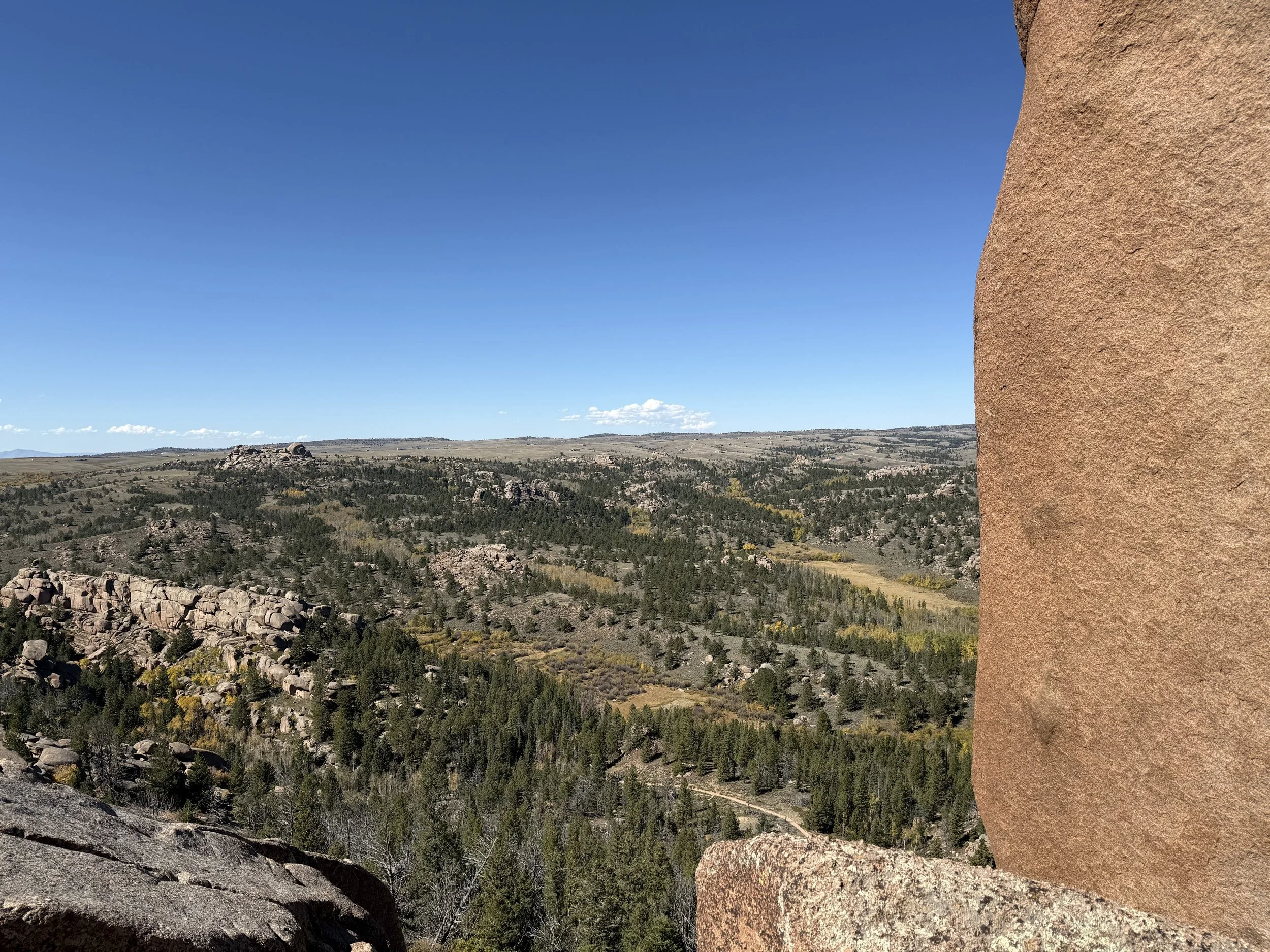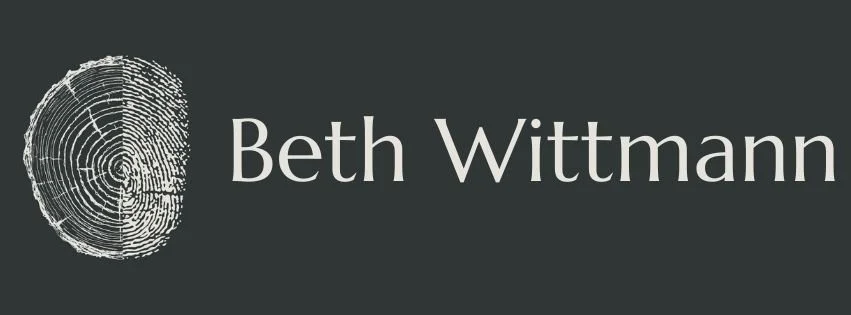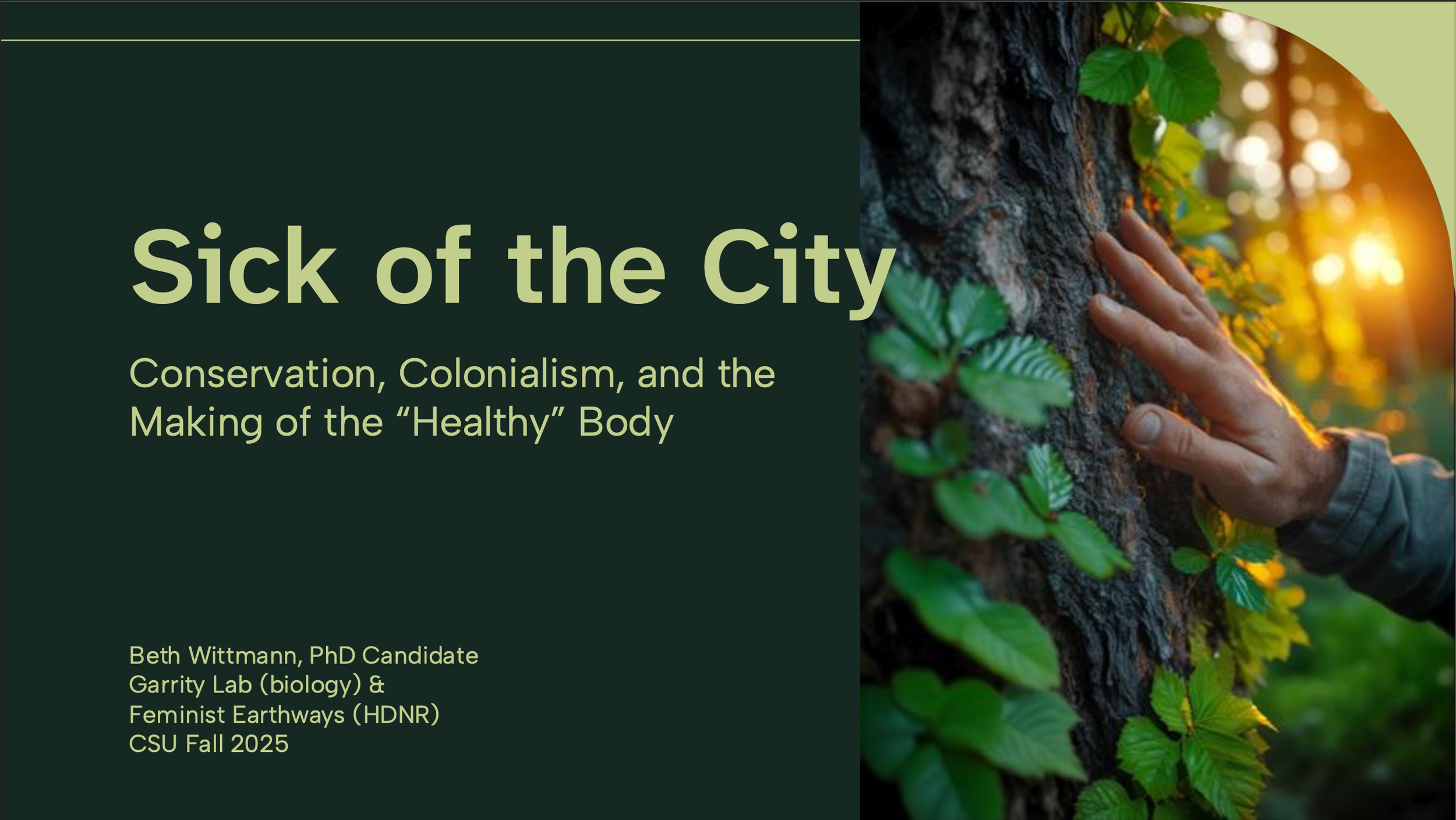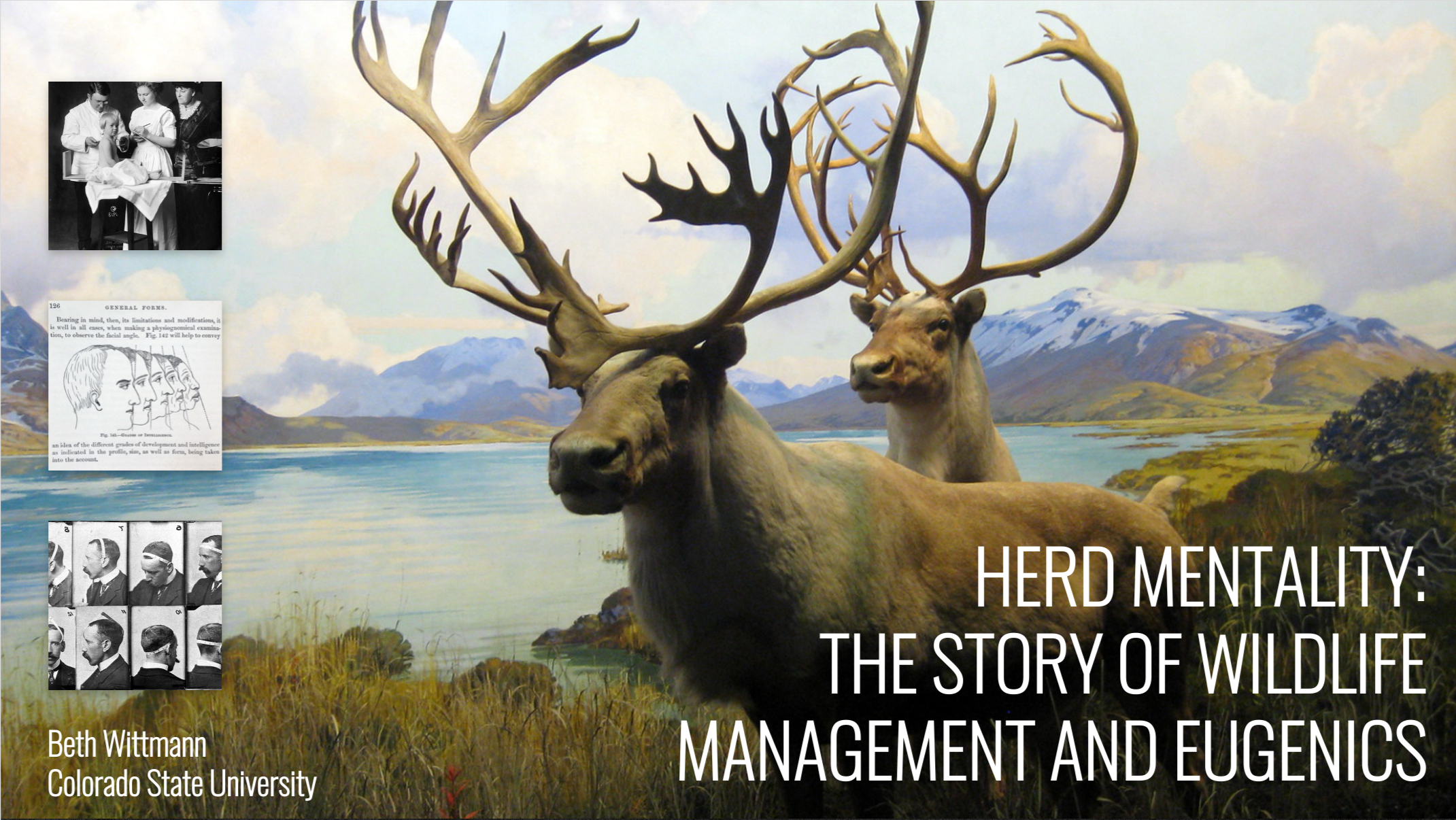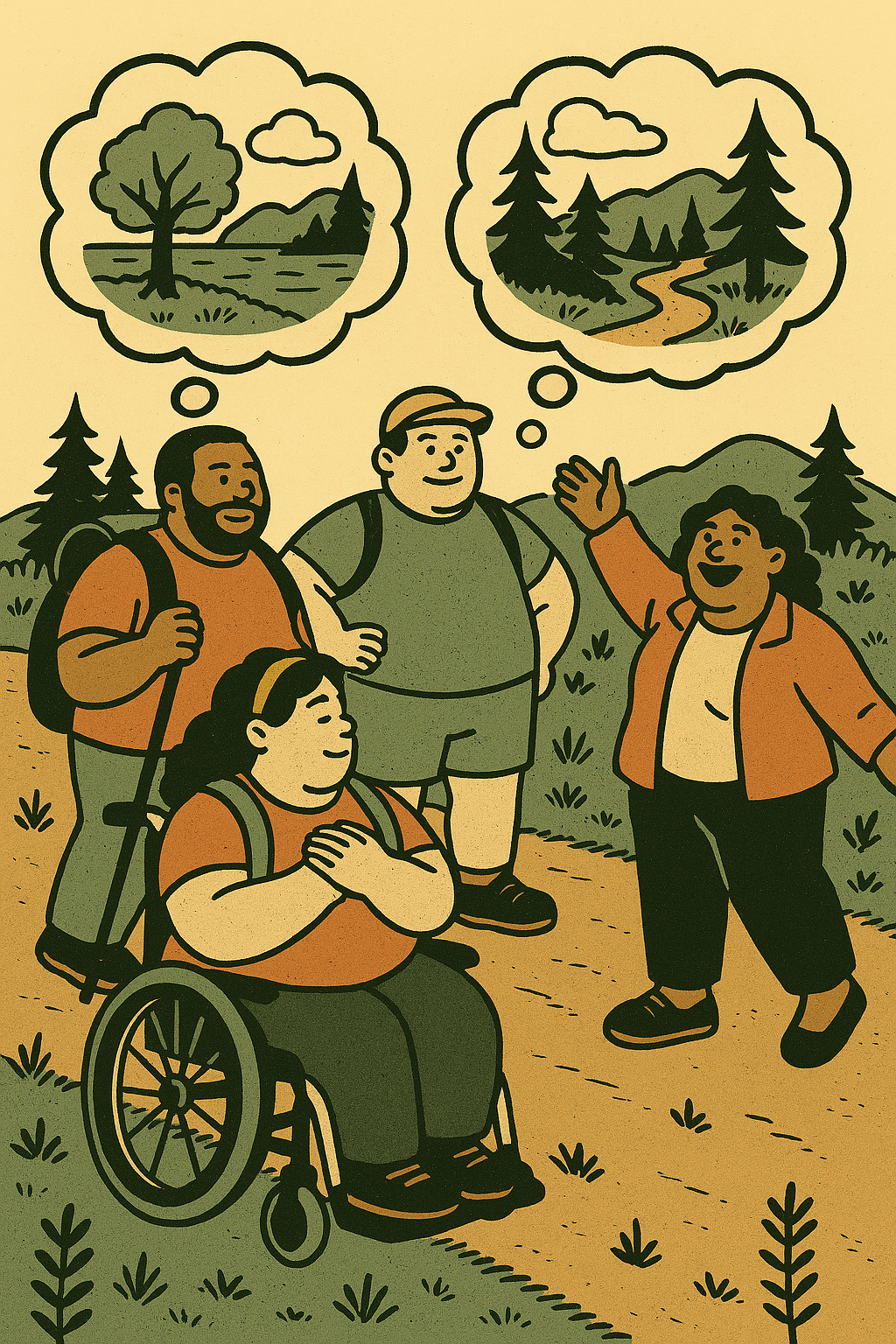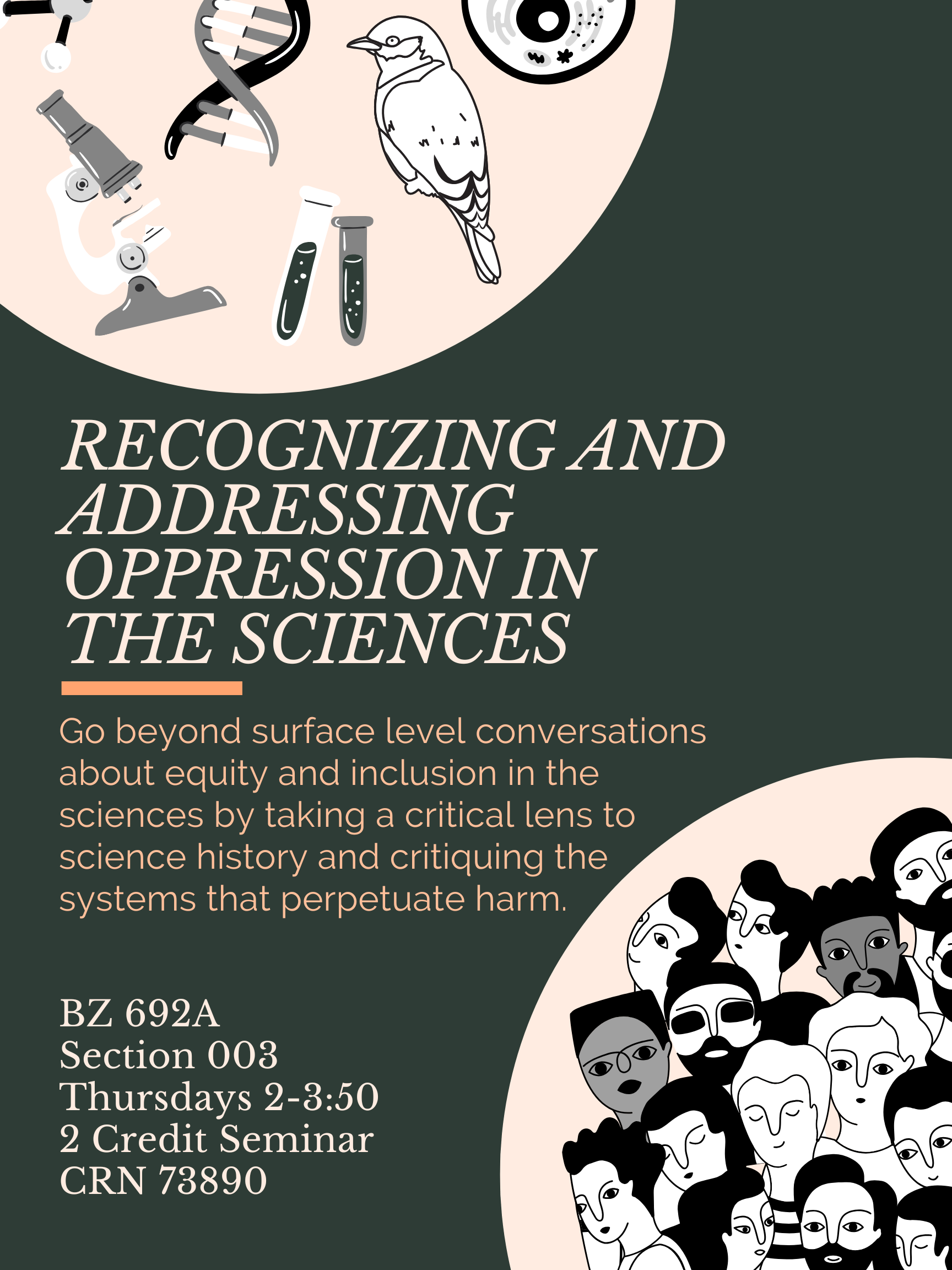Curious to Learn More?
You’ve come to the right place.
Scroll below for resources by project and resource type.
Sick of the City: Unpacking the Fat Body Politics of Wilderness
-
The rising fat liberation movement in the US is giving a voice to experiences of exclusion amongst fat outdoorists in nature spaces. To understand the origin of this marginalisation, this work examines American environmental history from the late 1800s to the early 1900s to reveal how anxieties of elite white men shaped wilderness and outdoor culture. It tracks the redefinition of wilderness from dark savage landscapes to pure nature spaces that existed in opposition from cities and how wilderness then became an antidote to the overcivilisation of urban bodies. Through this work, we argue that body size was a culturally impactful factor in establishing the ideal fit environmental body and the alienation of subjugated bodies from nature.
-
Wittmann, B., & Garrity, D. (2025). Sick of the City: Unpacking the Fat Body Politics of Wilderness. Environment and History, 1–23. https://doi.org/10.3828/whpeh.63861480345888
Cronon, William. “The Trouble with Wilderness: Or, Getting Back to the Wrong Nature.” Environmental History 1, no. 1 (January 1, 1996): 7–28. https://doi.org/10.2307/3985059.
Johnston-Goodstar, Katie. “Decolonizing Youth Development: Re-Imagining Youthwork for Indigenous Youth Futures.” AlterNative: An International Journal of Indigenous Peoples 16, no. 4 (December 2020): 378–86. https://doi.org/10.1177/1177180120967998.
Potvin, Leigh, and Blair Niblett. “Queer, Fat, and OUTdoors.” Parks Stewardship Forum 39, no. 2 (May 15, 2023). https://doi.org/10.5070/P539260973.
-
Farrell, Amy Erdman. Fat Shame: Stigma and the Fat Body in American Culture. New York, UNITED STATES: New York University Press, 2011. http://ebookcentral.proquest.com/lib/csu/detail.action?docID=865462.
Powell, Miles A. Vanishing America: Species Extinction, Racial Peril, and the Origins of Conservation. Cambridge, Massachusetts: Harvard University Press, 2016.
Ray, Sarah Jaquette. The Ecological Other: Environmental Exclusion in American Culture. Tucson: University of Arizona Press, 2013.
Schwartz, Hillel. Never Satisfied: A Cultural History of Diets, Fantasies, and Fat. 1st Anchor Books ed. New York: Anchor Books, 1990.
Spence, Mark David. Dispossessing the Wilderness: Indian Removal and the Making of the National Parks. New York; NY: Oxford Univ. Press, 2000.
Strings, Sabrina. Fearing the Black Body: The Racial Origins of Fat Phobia. New York, NY: New York University Press, 2019.
-
Herd Mentality: American Eugenic Conservationists in the 1900s and the Connection Between the Conservation and Eugenics Movements
-
US conservation history is typically retold from a Western perspective and has established iconic figures as founders who came to prominence during the conception of the conservation movement. However, another immensely impactful movement was growing concurrently in the US, eugenics. Previous scholarship has identified a significant number of prominent conservationists who were also leaders in American eugenics. In this paper, the historical figures who supported eugenics, here called eugenic conservationists, are profiled in one work to underscore the scope of this phenomenon. Furthermore, I use decolonial theory to propose an epistemological critique of the foundation ethos of Western science that could have made the uptake of eugenics so easeful for so many conservationists. I also use and settler colonial critique to expose how eugenics and conservation both aimed to engineer a future in which white American settlers would dominate the land through a logic of elimination. Taken together, these analyses argue that eugenic logics have always been and continue to be a part of the conservation movement.
-
Allen, G. E. (2013). “Culling the Herd”: Eugenics and the Conservation Movement in the United States, 1900–1940. Journal of the History of Biology, 46(1), 31–72. https://doi.org/10.1007/s10739-011-9317-1
Dyett, J., & Thomas, C. (2019a). Overpopulation Discourse: Patriarchy, Racism, and the Specter of Ecofascism. Perspectives on Global Development and Technology, 18(1–2), 205–224. https://doi.org/10.1163/15691497-12341514
Layden, T., David-Chavez, D., Galofré García, E., Gifford, G., Lavoie, A., Weingarten, E., & Bombaci, S. (2025). Confronting colonial history: Toward healing, just, and equitable Indigenous conservation futures. Ecology and Society, 30(1), art33. https://doi.org/10.5751/ES-15890-300133
Linett, M. (2023). Mind the Gap: Eugenics and Animality. Journal of Literary & Cultural Disability Studies, 17(4), 435–451. https://doi.org/10.3828/jlcds.2023.33
Persinger, C. (Forthcoming). The Race Politics of Bison Conservation. Environmental Ethics, 47.
Powell, M. A. (2015). “Pestered with Inhabitants”: Aldo Leopold, William Vogt, and More Trouble with Wilderness. Pacific Historical Review, 84(2), 195–226. https://doi.org/10.1525/phr.2015.84.2.195
Schmitt, C., & Cohen, L. (2024). Untangling roots: Reflections on eugenics, conservation, and US national parks. Parks Stewardship Forum, 40(2). https://doi.org/10.5070/P540263642
Tuck, E., & Yang, K. W. (2012). Decolonization is not a metaphor. Decolonization: Indigeneity, Education & Society, 1(1). http://decolonization.org/index.php/des/article/view/18630
-
Dunbar-Ortiz, R. (2014). An indigenous peoples’ history of the United States. Beacon Press.
Ordover, N. (2003). American eugenics: Race, queer anatomy, and the science of nationalism. University of Minnesota Press.
Powell, M. A. (2016). Vanishing America: Species extinction, racial peril, and the origins of conservation. Harvard University Press.
Ray, S. J. (2013). The ecological other: Environmental exclusion in American culture. University of Arizona Press.
Spiro, J. P. (2009). Defending the master race: Conservation, eugenics, and the legacy of Madison Grant. University of Vermont Press ; Published by University Press of New England.
Stern, A. M. (2016). Eugenic nation: Faults and frontiers of better breeding in modern America (Second edition). University of California Press.
Taylor, D. E. (2016). The rise of the American conservation movement: Power, privilege, and environmental protection. Duke University Press.
-
-
Beth’s Guest Lecture - contact for full Youtube video
Body Size and Nature Interview Study
-
I spoke with 16 participants from all over the U.S. who identify as fat or in a larger body size about their nature experiences. This is the last chapter of my dissertation and data are currently being analyzed to create findings.
-
Messing, Mackenzie L. “Fat Outside: An Arts-Based and Narrative Inquiry Approach to Building Fat-Positive Community and Connection in Nature.” Thesis, Northern Arizona University, 2022.
Potvin, Leigh, and Blair Niblett. “Queer, Fat, and OUTdoors.” Parks Stewardship Forum 39, no. 2 (May 15, 2023). https://doi.org/10.5070/P539260973.
Stanley, P. (2020). Unlikely hikers? Activism, Instagram, and the queer mobilities of fat hikers, women hiking alone, and hikers of colour. Mobilities, 15(2), 241–256. https://doi.org/10.1080/17450101.2019.1696038
-
Fearing the Black Body by Dr. Sabrina Strings
What We Don’t Talk About When We Talk About Fat by Aubrey Gordon
“You Just Need to Lose Weight”: And 19 Other Myths About Fat People by Aubrey Gordon
Belly of the Beast by Da’Shaun Harrison
Fat Shame: Stigma and the Fat Body in American Culture by Amy Erdman Farrell
-
-
Netflix - Fit for TV
Recognizing and Addressing Oppression in the Sciences Graduate Course
-
A course co-designed and co-instrucuted by Beth.
Despite policies, programs, and the research of social scientists aimed at decreasing the disparity in educational equity for marginalized students in science, technology, engineering, and math (STEM) fields, the lack of enrollment and retention to degree in postsecondary education is well documented. What is often overlooked or misunderstood is the effect of the oppressive history of science on the present culture and subsequently the lack of individuals with marginalized identities.
This course is for those in the science community who are interested in examining the root causes of the oppressive systems that operate covertly and sometimes explicitly in our science communities and research today. We use a critical feminist lens to look back at the course of science and the harm it has caused to marginalized communities in order to have a better eye for the ways science perpetuates current harm.
Topics includes: epistemologies, race science and eugenics (in the U.S.), overpopulation myths, sex and gender beyond the binary, medical racism, anti-fat bias, and science as a tool of colonialism.
-
U.S. Scientists’ Role in the Eugenics Movement (1907–1939): A Contemporary Biologist’s Perspective by Steven A. Farber, 2018
Harvard’s Eugenic Era by Adam S. Cohen, 2016
Statistics, Eugenics, and Me by Rapheal Sonabend
Overpopulation Discourse: Patriarchy, Racism, and the Specter of Ecofascism by Dyett & Thomas, 2019
The Gender Similarities Hypothesis by Janet Shibley Hyde, 2005
“It’s completely erasure”: A Qualitative Exploration of Experiences of Transgender, Nonbinary, Gender Nonconforming, and Questioning Students in Biology Courses by Casper et al., 2022
Beyond the Slave Trade, the Cadaver Trade by Daina Ramey Berry, 2018
The “difficult” cadaver: weight bias in the gross anatomy lab by Goss et al., 2020
Native American leaders call for Harvard to return human remains by Steven Senne
-
Superior: The Return of Race Science by Angela Saini
Sexing the Body: Gender Politics and the Construction of Sexuality by Anne Fausto-Sterling
The Evolution of Sex Determination by Beukeboom and Perrin
Medical Apartheid: The Dark History of Medical Experimentation on Black Americans from Colonial Times to the Present
Belly of the Beast by Da’Shaun Harrison
Native American DNA: Tribal Belonging and the False Promise of Genetic Science by Dr. Kim Tallbear
-
-
Inspiration and Intellectual Lineage
-
My academic inspiration pictured from top left to bottom right:
Dr. Alison Kafer, Aubrey Gordon, Audre Lorde, and Tigress Osborn
Dr. Eve Tuck, Alok Vaid-Menon, and Alice Wong
Dr. Sandra Harding, Dr. Sabrina Strings, Da’Shaun Harrison
-
Lorde, A. (2007). Uses of the erotic: The erotic as power. In Sister outsider: Essays and speeches (pp. 53-59). Crossing Press.
Kafer, A. (2013). Bodies of nature: The environmental politics of disability. Lexington Books.
Strings, Sabrina, 'Fat as a Floating Signifier: Race, Weight, and Femininity in the National Imaginary', in Natalie Boero, and Katherine Mason (eds), The Oxford Handbook of the Sociology of Body and Embodiment (2020; online edn, Oxford Academic, 8 Jan. 2019), https://doi.org/10.1093/oxfordhb/9780190842475.013.9.
Tuck, E., & Yang, K. W. (2012). Decolonization is not a metaphor. Decolonization: Indigeneity, Education & Society, 1(1), 1–40.
-
Fearing the Black Body by Dr. Sabrina Strings
What We Don’t Talk About When We Talk About Fat by Aubrey Gordon
“You Just Need to Lose Weight”: And 19 Other Myths About Fat People by Aubrey Gordon
Belly of the Beast by Da’Shaun Harrison
Your Wound is My Garden by Alok Vaid Menon
Science and Social Inequality by Sandra Harding
Disability Visibility by Alice Wong
Heavy by Kiese Laymon
-
-
